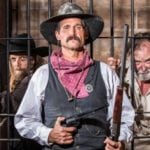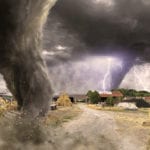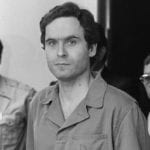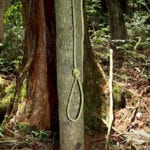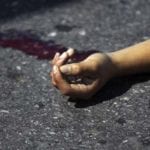 Creepy
Creepy  Creepy
Creepy  Movies and TV
Movies and TV 10 Movies That Get Elite Jobs Right, According to Experts
 Weird Stuff
Weird Stuff 10 Times Real Laws Were Based on Bizarre Hypotheticals
 Animals
Animals 10 Inspiring Tales of Horses Being Human
 Mysteries
Mysteries Top 10 Haunting Facts About the Ghost Ship MV Alta
 History
History 10 Surprising Stories About the Texas Rangers
 Humans
Humans 10 Philosophers Who Were Driven Mad by Their Own Theories
 Miscellaneous
Miscellaneous 10 Video-Game-Worthy Weapons and Armors from History
 Weird Stuff
Weird Stuff 10 Psychics Who Accurately Predicted Wartime Events
 The Arts
The Arts 10 Pieces of Art Inspired by a Broken Heart
 Creepy
Creepy 10 Death Superstitions That Will Give You the Creeps
 Movies and TV
Movies and TV 10 Movies That Get Elite Jobs Right, According to Experts
 Weird Stuff
Weird Stuff 10 Times Real Laws Were Based on Bizarre Hypotheticals
Who's Behind Listverse?

Jamie Frater
Head Editor
Jamie founded Listverse due to an insatiable desire to share fascinating, obscure, and bizarre facts. He has been a guest speaker on numerous national radio and television stations and is a five time published author.
More About Us Animals
Animals 10 Inspiring Tales of Horses Being Human
 Mysteries
Mysteries Top 10 Haunting Facts About the Ghost Ship MV Alta
 History
History 10 Surprising Stories About the Texas Rangers
 Humans
Humans 10 Philosophers Who Were Driven Mad by Their Own Theories
 Miscellaneous
Miscellaneous 10 Video-Game-Worthy Weapons and Armors from History
 Weird Stuff
Weird Stuff 10 Psychics Who Accurately Predicted Wartime Events
 The Arts
The Arts 10 Pieces of Art Inspired by a Broken Heart
10 Horrifying Stories Of Life In The Wild West
While the Wild West wasn’t quite the world of gunslingers and desperadoes portrayed in movies, it was still a dangerous place. With law enforcement often miles away, criminals flourished, and people were left to take matters into their own hands—often with terrifying results.
10The People Under The Floor

In 1870, a man was making his way through the lonely mountains of New Mexico when he came across a stout wood cabin tucked at the foot of the Palo Flechado pass. The owner introduced himself as Charles Kennedy and invited his new acquaintance inside for a meal.
As Kennedy’s Ute wife served dinner, the traveler sat next to the couple’s young son and asked if there were other Native Americans nearby. The boy looked back at him for a moment and then answered: “Can’t you smell the one Papa put under the floor?”
The unfortunate traveler had stumbled into the lair of one of the West’s most notorious killers. Charles Kennedy killed at least 14 people who stopped at his isolated homestead on their way through the pass. After shooting the traveler, Kennedy beat his son to death for nearly warning the man in time to escape.
The murder of their son was too much for Kennedy’s wife, who slipped out of the house while her husband was drunk and walked to Elizabethtown, where she made a full confession. After unearthing the grisly evidence, the townsfolk dragged Kennedy behind a horse until he died and then staked his severed head outside the local inn.
9Clay Allison’s War Dance

The leader of the mob that butchered Charles Kennedy was Clay Allison, a violent local vigilante who might have racked up a higher body count than the serial killer he beheaded. On one occasion, he tried to settle a petty dispute with a neighbor by digging a grave and proposing that they have a knife fight inside it, thus saving the effort of moving the loser’s body.
Allison gained notoriety as one of the deadliest participants in the Colfax County War, a massive land dispute that caused up to 200 murders. At the start of the war, Allison organized the lynching of a local constable he suspected was moonlighting as an assassin. When the dead man’s uncle came looking for revenge, Allison got the drop on him and shot him dead in the local saloon. He reportedly then stripped naked, tied a red ribbon around his penis, and did a “war dance” around the crime scene.
8The Going Snake Fight

Nobody’s certain exactly what caused the feud that left 11 men dead in Judge Blackhawk Sixkiller’s courtroom at Going Snake. Whatever it was, it came to a head in 1872, when Zeke Proctor rode up to Jim Kesterton’s mill and opened fire. The miller recovered from his wounds, but his wife, Polly Beck, was hit by a stray round and killed.
The murder took place in the Cherokee Nation, and Proctor and Beck were both Cherokee, so it seemed obvious that the case would be handled by the Cherokee courts. But Proctor came from a well-connected family and was a member of the powerful Keetoowah Society. As a result, the Becks argued that they couldn’t get a fair hearing in Indian Territory. They wanted the case transferred to the federal court at Fort Smith. When their request was rejected, a group of Becks burst into the courtroom and opened fire.
But things went wrong for the Becks, who found themselves crowded in the doorway of the windowless courtroom. Zeke Porter somehow produced a gun and fired back, as did several guards. The planned massacre turned into a nightmarish close-range battle. Eleven men died: seven Becks, two Proctors, a lawyer, and a US marshal. The participants quickly scattered, and nobody was ever convicted over the incident.
7The Crusade Of Felipe Espinosa

Felipe Espinosa was a petty criminal who deeply resented the movement of Anglo-American settlers into 19th-century Colorado. He was also a fanatical member of the Penitentes, a local Catholic brotherhood known for whipping themselves bloody and performing other acts of self-mutilation. When American soldiers tried to arrest him for banditry, Felipe declared his own personal war on the Protestant interlopers.
Accompanied by his brother Vivian, and later his nephew Jose, Felipe roamed through the mountains of Colorado, slaughtering every Anglo he came across. Some of the bodies were found with a cross carved into their chest. Felipe wrote taunting letters to the governor, telling him to inquire if anyone had ever “killed as many men as the Espinosas. We have killed thirty-two.” Despite a massive manhunt, which killed Vivian Espinosa, Felipe remained elusive. In a letter to his wife, he boasted:
They have hands and cannot touch me;
They have feet and cannot catch me;
They have eyes and cannot hear me;
They have ears and cannot hear me.
The desperate government finally hired the famed mountain man Tom Tobin, who tracked Felipe and Jose Espinosa through the Sangre de Cristos and personally killed both in a bloody battle near the summit of Mount Mestas. Tobin then returned to Fort Garland and collected his bounty by dumping Felipe Espinosa’s severed head in front of the shocked colonel who had hired him.
6The Cowboy Cop Of El Paso

In 1881, El Paso, Texas, hired the legendary gunfighter Dallas Stoudenmire as their new marshal. He successfully cleaned up the town, but only by launching a reign of terror in which he killed numerous locals in shoot-outs. It was said that he used the church bell for target practice and was often visibly drunk. When the town council tried to fire him, Stoudenmire charged in and dared them to try taking his guns.
Stoudenmire’s most famous gunfight took place just three days after taking the job. The “Four Dead in Five Seconds” fight started when a local ruffian named John Hale grabbed a gun from his friend George Campbell and killed one of Stoudenmire’s constables. Stoudenmire immediately whipped out his own pistols and gunned down Hale, a random bystander, and Campbell (who was loudly shouting that he wanted nothing to do with the fight).
Campbell had been good friends with the wealthy Manning brothers, who hired a man named Bill Johnson to assassinate Stoudenmire in revenge. Unfortunately for Johnson, he discharged his shotgun early, allowing Stoudenmire to whirl around and shoot his testicles off. He quickly bled to death, and Stoudenmire remained in El Paso until he died in a shoot-out with the Manning brothers 18 months later.
5The Horrible Horrells

The Horrell Brothers were a nightmarish family of cowboys who carried out some of the Old West’s worst atrocities. In 1873, they murdered five policemen in a Texas bar and fled to Lincoln County, New Mexico. Shortly after they arrived, Ben Horrell drunkenly gunned down yet another lawman, only to be murdered in turn by a local posse. Ben’s killers were mostly of Mexican descent and the remaining Horrells decided to take revenge on the entire Hispanic community.
The ensuing race war started with the murder of two Mexican Americans on the Horrell ranch. A few weeks later, the Horrells burst into a wedding reception and killed four guests. Local Hispanics armed themselves and seized the hills surrounding the Horrell property, but the Horrells withstood a short siege and escaped before the ranch was burned to the ground. Recruiting a gang of Texans, they rode through the country massacring random Mexicans (and at least one Anglo with a Mexican wife).
The killings ended when local authorities requested military assistance and the Horrells fled back to Texas. Official estimates say at least 29 people died in the “war.”
4The Horrell-Higgins Feud
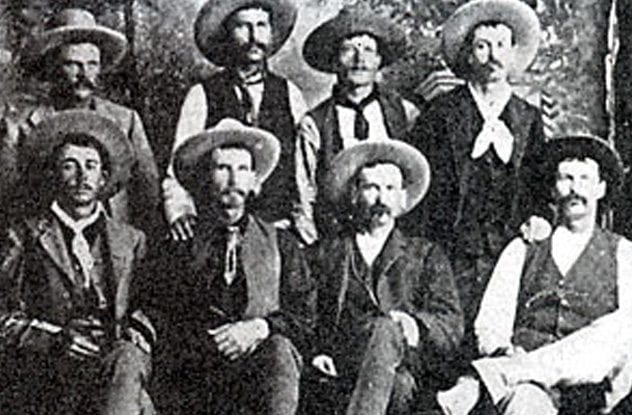
After returning to Lampasas, Texas, the Horrells secured a jury of their old cronies and were promptly acquitted of the New Mexico murders. But the crimes would catch up with them in a way. In 1877, Merritt Horrell died in a barfight with rancher “Pink” Higgins. Since everyone remembered the massacres triggered by Ben Horrell’s death, the terrified Higgins family decided that they had no option but to strike first.
In March, the Higgins clan ambushed Tom and Mart Horrell on their way to court. But they were no match for a hardened killer like Mart Horrell, who stood over his wounded brother and single-handedly drove off the attackers. By June, Lampasas had become a miniature war zone, as the feuding families battled each other through the town.
The Texas Rangers ended the feud by forcing the clans to sign a “peace treaty.” Astonishingly, the Horrells were allowed to continue their criminal ways for another year, until Mart and Tom were murdered by an enraged mob, apparently incited by Pink Higgins.
3The Bascom Incident
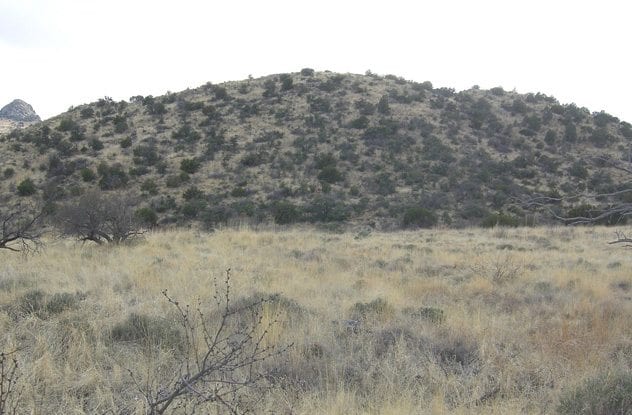
In 1860, the inexperienced Lieutenant George Bascom was ordered to retrieve a young boy who had been kidnapped in a Native American raid. Bascom wrongly believed the Chiricahua Apache were responsible and rode off to find their leader, Cochise. Meanwhile, Cochise had no idea he was being hunted and simply rode into Bascom’s camp for a visit one day, accompanied by his wife and son.
A ridiculous conversation followed, with Bascom making all sorts of threats unless the boy was returned immediately, and a frustrated Cochise insisting that he didn’t have the boy and therefore couldn’t return him. Bascom then announced that he was taking Cochise and his family prisoner, at which point Cochise whipped out a knife, sliced through the side of the tent, and sprinted out of the camp with bullets whizzing around him.
Bascom still had Cochise’s wife and son hostage, so the Apaches attacked a wagon train, tortured eight Mexicans to death, and kidnapped four Americans as bargaining chips. However, Bascom stubbornly refused to make the trade unless the kidnapped boy was included. In a fury, Cochise slaughtered his hostages and retreated. After some consultation, the Americans hanged most of their own hostages and likewise retreated. The ensuing war lasted a decade and killed thousands.
2The Death Of Mangas Coloradas

The brutality of the war sparked by the Bascom Incident can be seen in the death of Mangas Coloradas. While the American Civil War raged, the Apaches drove white settlers out of most of southern Arizona. However, reinforcements began arriving as the war in the east wound down and it became clear that the Apaches couldn’t hold out forever. Cochise’s father-in-law, the great chief Mangas Coloradas, decided to try to negotiate peace.
When the chief rode up with a flag of truce, General Joseph West immediately had him arrested. He then took the guards aside and told them that the “old murderer . . . has left a trail of blood for 500 miles on the old stage line. I want him dead or alive tomorrow morning, do you understand? I want him dead.”
That night, the guards entered the room where the chief was being held, tortured him with red hot bayonets, scalped him with a cooking knife, and then shot him dead “while trying to escape.” The war would rage for several more years.
1Papa Nicetas
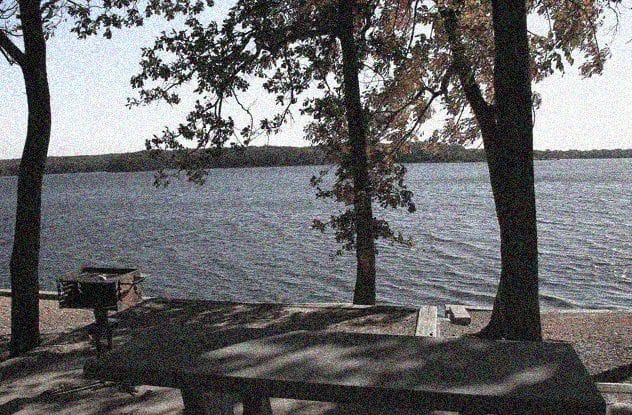
In 1870, four people settled in Labette County, Kansas, not far from where a young Laura Ingalls Wilder lived with her parents. They called themselves the Benders and claimed to be a family, although the exact nature of their relationship would later be questioned. Ma and Pa Bender spoke only German, but their children were fluent in English, and the family soon turned their one-bedroom shack into a small inn. They were rumored to practice magic, and Kate Bender became popular locally as a fortune teller and spiritualist.
In the years that followed, settlers began to vanish while traveling through Labette County. Body parts began to turn up in the countryside, but nobody knew who to blame. Eventually, the locals held a meeting and agreed to form a party to search every house in the area, but this was delayed by bad weather. When the party finally reached the Bender place, the family were long gone.
Underneath the bed, a trapdoor led to a secret basement, where the floor was stained with blood. Eight bodies were found buried in the garden, each with a cut throat and a smashed skull. The Benders were never found, and it’s unknown how many more victims they claimed over the years.
